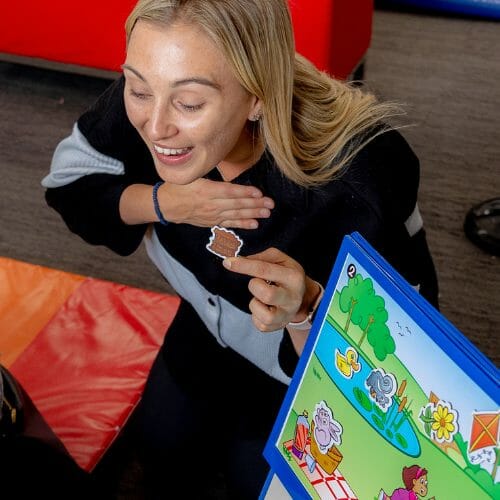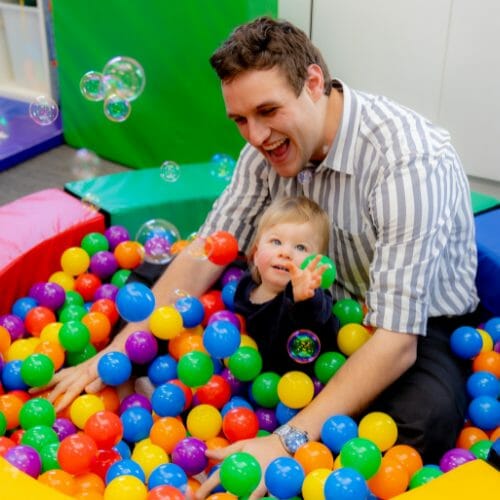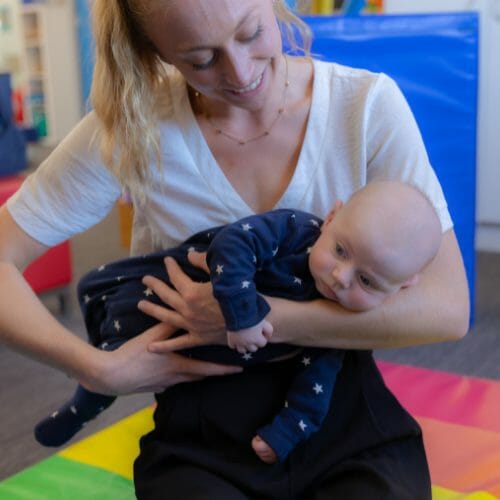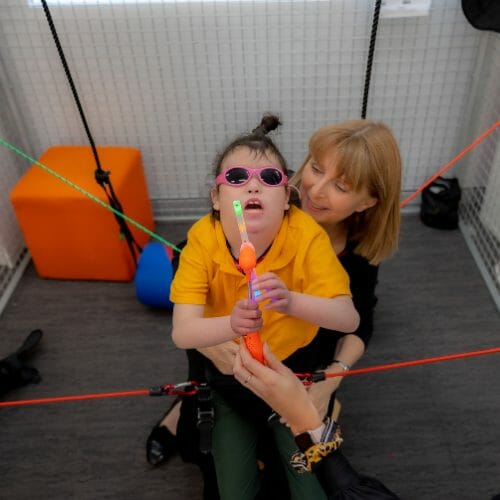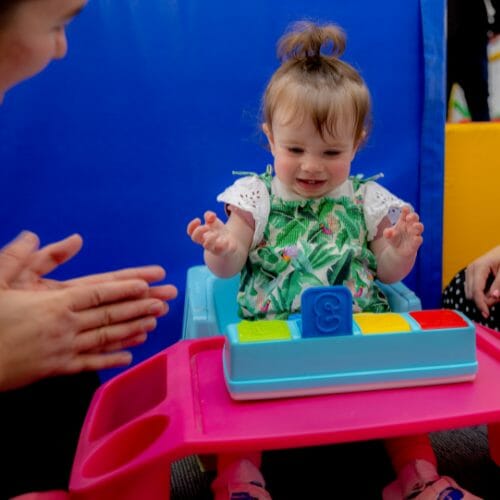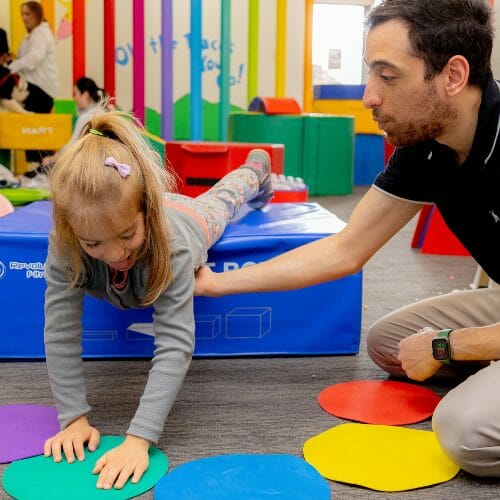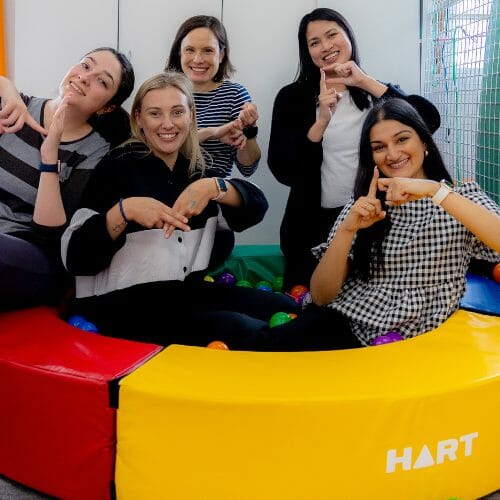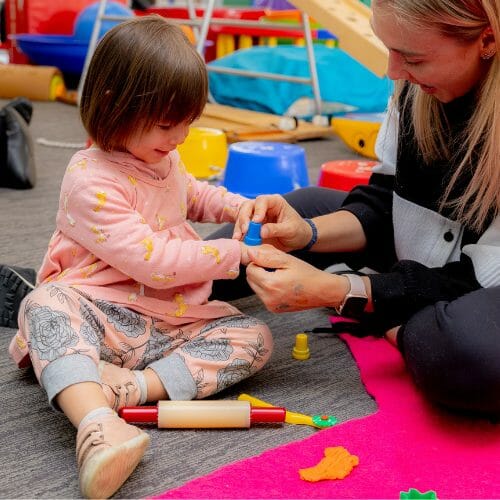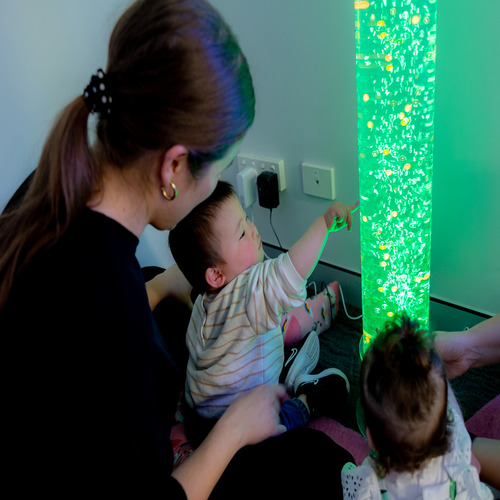What is Vision Impairment?
Vision impairment is a term that covers many vision problems as well as different kinds of vision loss. Children with vision loss experience the world in a different way from other children. Vision impairment means lots of different things. It can range from no vision (blindness) or very low vision to not being able to see particular colours. Vision impairment can happen at any age.
What is low vision?
Low vision is when your child can’t see all the things they should be able to see for their age.
What is legal blindness?
A child is considered legally blind when they can’t see at 60m what a child with normal vision can see at 60 m, or if field of vision is less than 20° in diameter (a person with normal vision can see 180°). Severe vision loss (blindness) can mean that some parts of your child’s development and learning will be slower than for other children. For example, your child is slower in learning to roll over, crawl, walk, speak and be social with others, your child is slower in learning how to play, achieve cognitive milestones and use their hands effectively. Your child’s ability to do all these things should come with time and assistance.
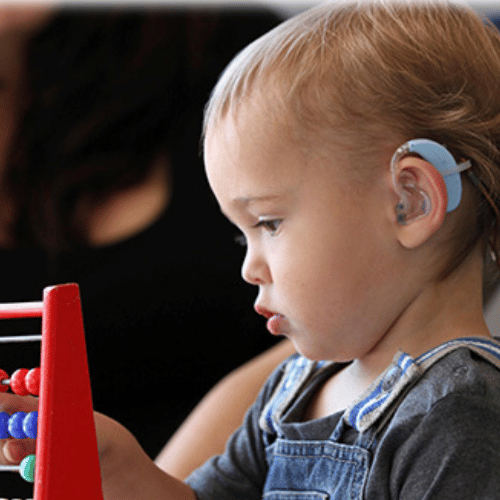

Causes of Vision Impairment
There are multiple causes of vision impairment in children. These include genetic conditions, damage or injury to the eye or to the pathways connecting the eye to the brain or to the visual centre of the brain. Your child might have vision impairment at birth. It can also happen later as a result of disease, injury or a medical condition.
The most common causes of vision impairment are:- Neurological conditions that affect the parts of the brain that control sight (cortical vision impairment or CVI)
- Cataracts
- Genetic conditions such as Albinism and retinitis pigmentosa.
If you think your child has vision problems, it’s very important to visit your doctor as soon as possible to get a diagnosis. Your GP will probably send you to a Paediatric Ophthalmologist. The Ophthalmologist will be able to examine your child and do tests to work out what the problem is.
How is physical development affected if a child has a vision impairment?
A child with vision impairment may have:- Delayed gross motor skills such as rolling, sitting, walking and reaching out for objects
- Delayed fine motor skills, for example, picking objects up and manipulating objects with fingers and hands
- Adopt a “head down” posture and have poor body awareness
- Poor confidence to move in their environment
- Difficulties with balance
- Hypotonia and poor posture
- Other sensory issues such as tactile defensiveness (eg. your child might be afraid to touch certain textures or explore areas they can't see )
- Have acute sensitivity to noise
- Assist you to devise alternative incentives to develop gross motor skills
- Assist you to devise alternative incentives to develop fine motor skills
- Develop body and spatial awareness
- Assist with developing balance
- Assist with proprioception and sensory issues
- Develop movement and language through co-active demonstration and play
- Work with a mobility instructor to help develop independence in walking
- Assist your child to find ways to get involved in games and sports with peers
- Develop some strength-building activities into daily life
- Advise on toys and equipment necessary for the home, school and other important environments.
What you can do
Engage your child in exploring their environment using whatever vision they have – and linking the vision they have with all other senses – this will help spark their curiosity about the world around them. Providing opportunities for sensory play, to introduce new textures in a graded way and provide experiences to practice balance and independent mobility. You can help your child find ways to get involved in games and sports with peers, and also to get some strength-building activities into daily life.
What is hearing impairment?
Hearing impairment occurs when there’s a problem with or damage to one or more parts of the ear. Between 9 and 12 children in every 10 000 live births will be born with at least moderate hearing loss in both ears. In every 10 000 children, 23 will get a hearing impairment that needs a hearing aid by the age of 17. Your child’s hearing impairment can happen at birth (congenital) or start after birth (acquired). Many premature infants will suffer from hearing loss. Some children have partial hearing loss, meaning that the ear can pick up some sounds, (your child might have muffled hearing, or he/she might not be able to hear sounds coming from some directions, or he/she might have trouble hearing certain frequencies or sounds), others have complete hearing loss, meaning that the ear cannot hear at all (people with complete hearing loss are considered deaf). In some types of hearing loss, a person can have much more trouble when there is background noise. One or both ears may be affected, and the impairment may be worse in one ear than in the other.
Some children who have a hearing impairment have another disability too. There are early intervention services specifically for infants and preschool children with hearing impairment and other disabilities often including physical disability.
What are the types of hearing loss?
There are two main types of hearing impairment – conductive and sensorineural.
Conductive Hearing Impairment
When sounds from outside your child’s ear have trouble getting to or going through the different parts inside the ear. Conductive hearing impairment is usually temporary.
Sensorineural Hearing Impairment
The nerves that are in charge of receiving sound and sorting out what it means don’t work properly. Sensorineural hearing impairment can be mild, moderate, severe, or profound. Sensorineural hearing impairment usually lasts for life and can worsen over time.
Some children have only conductive hearing impairment. Others have sensorineural hearing impairment as well. This is called a mixed hearing loss.
Universal newborn hearing screening
In Australia, universal newborn hearing screening is an essential part of diagnosing hearing impairment in children. All Australian states and territories have a universal newborn hearing screening program that aims to:
- screen the hearing of all babies by one month of age
- refer any babies with possible hearing impairment for diagnostic testing with an audiologist by three months of age
- start early intervention for those babies with hearing loss by six months of age

What is screening?
Screening equipment plays specific sounds into your baby’s ears and records the responses from your baby. The screening technology might be different in different parts of Australia. In most places, your baby will be screened in hospital, before you take your baby home. Each state has its own way of following up on babies who don’t have a hearing screen in the hospital.
Each state also has its own way of referring babies to audiology and supporting parents and families. Hearing screening isn’t compulsory. You have to give your permission for your baby to be screened, which means signing a consent form.
If the screening test doesn’t pick up any hearing problems at birth, or your child didn’t have his hearing screened as a newborn, but you’re concerned about your child’s hearing, speech, or language development, ask your doctor to refer you to an audiologist to get your child’s hearing tested.
Early diagnosis of hearing impairment means your child can get early intervention and support. This can make a big difference to her language development. If your child has an undiagnosed hearing impairment in early childhood, she could miss out on essential learning and development opportunities.
The Australasian Newborn Hearing Screening Committee website has links to each state and territory newborn hearing screening program, as well as other important newborn hearing screening links.
How Therapies for Kids can help
Early intervention services
The earlier you find out your child has a hearing impairment, the earlier she can begin therapy and have the language to communicate with. It also means you and your family can get advice and support as soon as possible, giving your child the best start in life.
It can be hard to know what to do when you first find out your child has a hearing impairment. Through early intervention services, you can work with health professionals who will help you learn how to spend time with your child in ways that support his development.
Children learn the most from the people who care for them and with whom they spend most of their time. When you learn some tips for playing, connecting, and communicating with your child throughout the day in ways that will encourage her hearing and development, it can help her a lot.
The team of professionals who might be involved in supporting you and your child includes:- Speech Pathologists
- Audiologists
- Special Education Teachers
Our Services
Intensive Therapy Programs
Intensive Therapy Programs
Physiotherapy
Physiotherapy
Occupational Therapy
Occupational Therapy
Speech Language Pathology
Speech Language Pathology
Exercise Physiology
Exercise Physiology
DMI Therapy
DMI Therapy
Suiting
Suiting
Telehealth
Telehealth
New to Therapies For Kids? Start your journey
Talk to our team now
Request a call back
We are here to help
